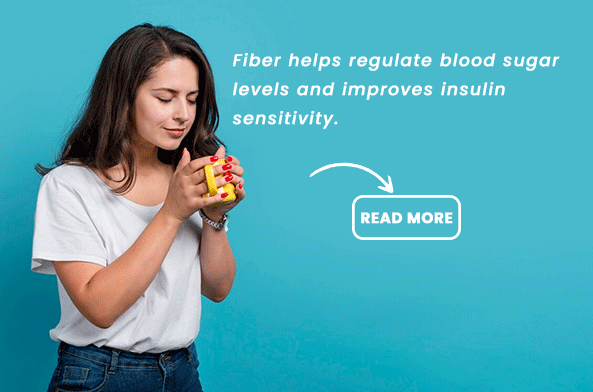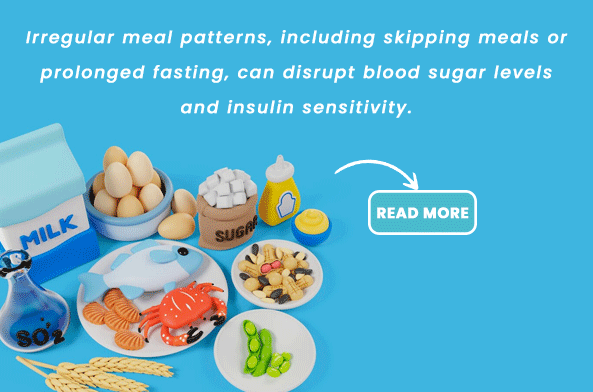Diabetes is a serious, chronic condition in which the body either cannot use the insulin it does produce efficiently or does not produce enough of it.
Over time, it may cause an excessive amount of glucose to enter the bloodstream, which could cause health issues. The precise causes of diabetes are unknown, despite the fact that it is a prevalent ailment.
But food and nutrition can play a role, particularly in type 2 diabetes, prediabetes, and gestational diabetes.

The things you eat and drink can have an impact on your blood sugar levels. For example, consuming a diet high in refined carbohydrates and added sugars may cause sudden spikes in blood sugar levels, which can lead to diabetes.
You cannot change your genetics, age, or race, but you can change your diet by paying attention to the foods and beverages you eat and drink. Know which foods are most likely to cause diabetes so that you may make better choices.
Relationship Between Diabetes and Food
Understanding the connection between diet and diabetes can be difficult, particularly if you have just received a diagnosis. How well your body uses fat, protein, and carbs for energy affects how the two are related.
The kind and quantity of food you eat will determine how much insulin you require. For instance, eating foods high in carbohydrates causes your body to start producing insulin right away.
It will result in a brief rise in blood sugar (often referred to as a postprandial spike) prior to the insulin’s actions taking effect. Individuals with type 1 diabetes, who are unable to manufacture insulin on their own, may see blood sugar rises that are more intense and stay longer.
According to a study, each person’s blood sugar response to food is very unique. Furthermore, blood sugar surge timing might differ from person to person and from meal to meal. As a result, monitoring your blood sugar levels before and after meals is essential if you have diabetes, especially type 1. With a continuous glucose monitor (CGM), post-meal patterns can be measured most accurately.
With the latest iteration of HealthifyPRO 2.0, you can monitor your blood glucose levels after meals with ease thanks to a wearable continuous glucose monitoring system that includes graphs and eliminates the need for finger pricking. Not only does CGM monitor your glucose levels after meals, but it also continuously measures them using a small sensor that is worn on your arm.
encourages you to make everyday attempts to maintain your health rather than pressuring you to aim for ideal blood glucose levels.
To achieve enduring and sustainable results, the Pro Plans offer expert coach advice, actionable insights, and real-time, data-driven decision-making.
What Food Causes Diabetes?
Red Meat
A daily serving of red meat increases the risk of type 2 diabetes by 19%, despite the fact that most people believe it to be a risk factor for heart disease.
Physicians think that red meat’s high iron content may harm cells that make insulin.
Consuming red meat—mostly processed red meat—can also lead to additional health issues associated with type 2 diabetes. Consequently, the risk of type 2 diabetes is reduced when red meat is substituted with a better protein source, such as skinless chicken, almonds, low-fat dairy, or whole grains.
Processed Foods
The risk of developing diabetes rises by 51% when processed foods are regularly consumed in place of fresh ones. Processed foods’ high sodium, sugar, flavoring, and preservative content may contribute to the development of diabetes. Thus, if feasible, opt for complete foods.
Saturated and Trans Fats
While trans fats are found in processed meals like baked goods and fried snacks, saturated fat is often found in animal-based items like butter and whole milk.
There could be less than 0.5 grams of residual trans fat even though a nutrition label states there are no grams of trans fat. Insulin resistance, low glucose tolerance, and high levels of bad cholesterol (LDL) can all be exacerbated by both forms of fat. You become more susceptible to diabetes as a result. Attempt to consume a diet high in mono- and polyunsaturated fats instead.
Added Sugar and Sodium
Diabetes is mainly caused by a diet heavy in sodium or added sugars.
Blood sugar spikes are brought on by added sugar, whereas other health problems like high blood pressure and heart disease are caused by consuming more sodium. All of these eventually lead to the development of prediabetes, which in turn leads to type 2 diabetes.
Snacking on Dried Fruit
Although eating too many dried fruits can result in blood sugar rises, they may look like a healthful snack. This is so because the fiber material in dried fruits, which encourages fullness and aids in blood sugar regulation, is mostly lost.
Therefore, eating dried fruits indicates that you are ingesting a significant amount of added sugar without the necessary fiber. An occasional dry fruit snack is acceptable, though. Nevertheless, it is preferable to choose fresh fruits with a high water content and a low GI.
Simple Carbohydrate-rich Foods
Your blood sugar is frequently affected when you eat starchy veggies with other foods high in carbohydrates. For example, rice with sweet potatoes will significantly influence your post-meal glucose level.
Continue reading: Foods high in carbohydrates that you should consume
While eating too many carbohydrates doesn’t directly increase your risk of developing diabetes, it can promote obesity, weight gain, and blood sugar rises, all of which can elevate your risk. As a result, exercise moderation and be conscious of the overall carbohydrate content.
Sugary Cereals
Most individuals consider flavor-infused morning cereal to be a convenient and satisfying choice. But cereals are frequently heavily processed and loaded with sugar and refined grains.
As a result, eating them early in the morning raises your risk of developing type 2 diabetes and other illnesses. As an alternative, you can have a quick breakfast of oats or a salad bowl with Greek yogurt.
The HealthifyMe Note
Since everyone has varied food choices, dietary limitations, and timetables, there is no one food that causes diabetes in all cases. There are some foods, though, that you should avoid. Eating meals high in sodium, saturated fat, trans fat, added sugar, or both can raise your risk of type 2 diabetes by making you overweight, obese, or insulin resistant.
Drinks that Can Cause Diabetes
What you drink matters just as much when it comes to lifestyle diseases as what you eat. Sometimes the difference between excellent and terrible health can be determined by a single drink. Drinks that have been sweetened or fruity, for instance, might quickly raise your blood sugar, so be cautious!
If you’re trying to avoid getting diabetes, stay away from these drinks:
Sweet Alcohol
Even while everyone’s reaction to alcohol varies greatly, excessively sugary alcoholic beverages have a greater potential to raise blood sugar levels. For instance, consuming excessive amounts of beer and sugary dessert wines may raise your risk of blood sugar swings.
Sweetened Sodas or Teas
A study shows that people who drank more than three sugar-sweetened beverages per week are 46% more likely to develop prediabetes than those who didn’t.
Simple carbs are the only kind of sugar-sweetened beverages that can raise blood sugar levels, such as concentrated fruit juices and sweetened bottled tea. They enter your bloodstream quickly and raise your blood sugar levels. As usual, eating whole fruits is preferable to drinking them.
Sports Drinks
Sports drinks should only be consumed by endurance athletes. Sports drinks have a lot of carbohydrates and sometimes even a lot of caffeine.
Sports or energy drinks are a good option for endurance athletes to replenish salt and nutrients. If you’re not working out hard, don’t drink sports beverages.
Regular Soda or Diet Soda
High levels of calories, carbs, sugar, artificial sweeteners, flavorings, and preservatives can be found in regular and diet soda drinks.
After just one glass of soda, you’ve taken in almost 10 spoonfuls of sugar. They result in insulin resistance and weight gain, which leads to type 2 diabetes.
Managing Diabetes – The Way
According to a study, putting a focus on food can help manage symptoms and keep complications from developing. To prevent the onset of diabetes and its problems, your nutritionist recommends making changes to your food preparation and dietary practices.Young adults would gain from making dietary quality improvements and moving toward a plant-based diet.
Research also reveals that increasing the intake of fruits, vegetables, nuts, seeds, whole grains, and vegetable oils leads to a 60% lower risk of type 2 diabetes.
If you’re looking for data-driven, technology-based, real-time guidance, subscribing might be an ideal way to tackle diabetes.
For instance, are you aware of the amount of calories or carbohydrates in the smoothie or salad you consumed today?
With real-time tracking devices like CGM and Smart Scale, it measures and tracks your glucose levels, calories, hydration, sleep, body fat, and muscle mass.It provides a clear picture of how your lifestyle and food choices impact your blood glucose levels.

Your Pro coaches work one-on-one with you to create a personalized food and exercise plan, assisted by the AI nutritionist RIA. The software generates regular data and syncs with several devices to provide you a comprehensive view of your health. This is the app to use if you want to see results that last.
Conclusion
No food is completely forbidden, however foods high in added sugar, sodium, saturated fat, and trans fat should be avoided or, if taken, should be consumed in moderation and in terms of frequency and portion sizes. Whenever you can, choose water as your beverage of choice.
See a nutritionist if you’re at danger of acquiring diabetes. They can help you design a personalized food plan and go over diet tactics.
As both can affect blood sugar levels, you can also upgrade to HealthifyPro, where the Pro Nutritionist discusses what to eat, when to eat it, and how much of it.

